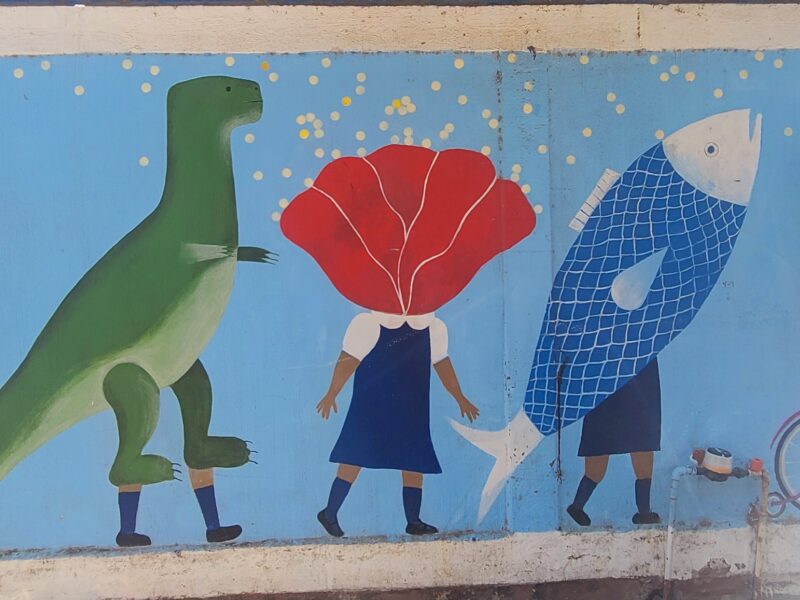Did the Dinosaurs Think?

It’s sometimes hard to believe, that we live our day to day lives on land that was once shaped by ice or volcanic lava, been the bottom of an ocean, or even a desert – that it is littered with layers of dinosaur bones and fossils of countless creatures. Our planet has endured an infinitely long history of transformation, yet it’s funny that we often long for things to stay the same. I think only the dinosaurs were afforded the luxury of relative stability for millions of years, but they paid the price for that.
The Netflix series “Life on the Planet”, is about the entire history of life on earth so far, skillfully narrated by Morgan Freeman. At the beginning, you learn that life started on the planet about 4 billion years ago, starting with invertebrates who happily ruled the oceans for eons. The little time scale on the bottom of the screen skips through millions of years, like they were nano seconds, bringing you to the next major change in evolution, such as the arrival of amphibians or reptiles.
The time of the dinosaurs was the most settled our geology or climate has ever been. I can see why kids love dinosaurs. There was every kind of dinosaur you could think of, some that lived in herds, flew in the air (which our birds are descended from), apex predators like T-Rex or that inhabited the water, like our very own cuddly Elasmosaurus, its bones found embedded in the high banks of the Puntledge River. At one point this creature would have swam by where my house is now. Things remained relatively peaceful for 150 million years, until an asteroid, the size of Mt. Everest, travelling twenty times the speed of a bullet crashed into Earth, which ended in a burning inferno that cooked most of the dinosaurs alive in a matter of 24 hours. The resulting wall of ash and debris blocked out sunlight, killing almost all life on earth. I think if this had been a fiction novel, I would have quit reading at this point, thinking the author was being unnecessarily dramatic – way too over the top. It was as if the dinosaurs didn’t matter at all.
In “Life on the Planet”, you step very far back, as far back as you can go, to view life from a very wide perspective. And when you do, you see a never-ending process of creativity and invention of infinite variety – but also staggering loss. Ten million species of plants and animals are alive today but they are only 1% of the species that have existed in all time. That is because of vast erasures. They happened with no consideration of how amazing or evolved the creatures or plants were. Apparently, our planet has gone through 6 mass extinctions (and is currently undergoing a 7th).
I feel like this series was made to reveal what a tiny blip of time us humans exist in, but also show us that all the things we share our planet with now, are the remnants and survivors of so much upheaval and change. It is hard to imagine that everything humans have invented, however solid or secure they may seem at the time; cities, civilizations, medicines, or technologies, will at some point be unrecognizably changed or simply gone. This is the same for many plants, animals or even lakes and mountains. We’ve already witnessed many of these losses. Granted, at the same time, some things may stay the same, like lizards, or sharks, or jellyfish.
I wonder what the dinosaurs thought (or if they thought). After being around for that many million years, reality must have just been so certain to them. We are not dinosaurs. We have to accept change, be willing to change, because some form of change will just happen to us regardless of what we do anyway. Our reality will change. Humans, and all our inherited creativity, for better or worse, are now influencing whole planetary processes; including the climate, geography and the oceans. A new geological age is even unofficially named after us, the “Anthropocene”. However, what is different about this tiny millisecond of time in “Life on the Planet”, is that unlike the dinosaurs, we humans have some awareness that the planet is undergoing these changes. Thankfully it is not at the suddenness caused by a speeding asteroid. Right now it looks like it is mostly up to humans – whether we like it or not – how the series will play out from here. I wonder who the next narrator will be?
The presence of feathers in tyrannosaurs and many other kinds of dinosaurs makes it very likely that the great T. rex was feathered, too. If the tyrant king was not fearsome enough already, just imagine it as an energetic, intelligent Big Bird from Hell. Stephen Brusatte
Photo above: Mural outside a school yard in LaCruz Mexico
